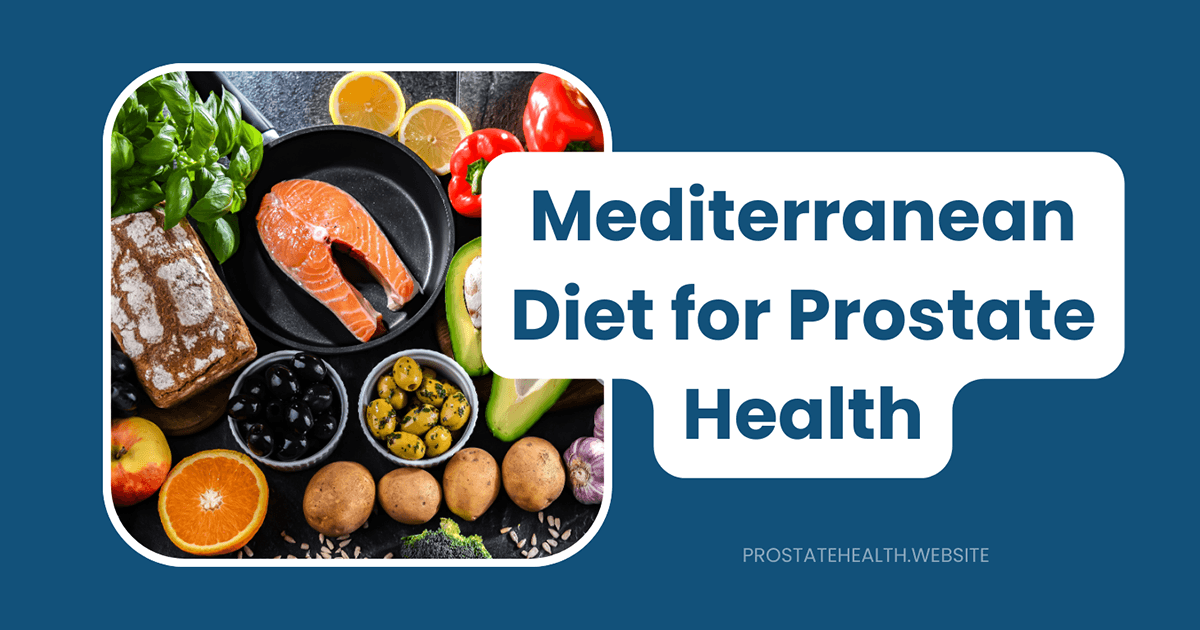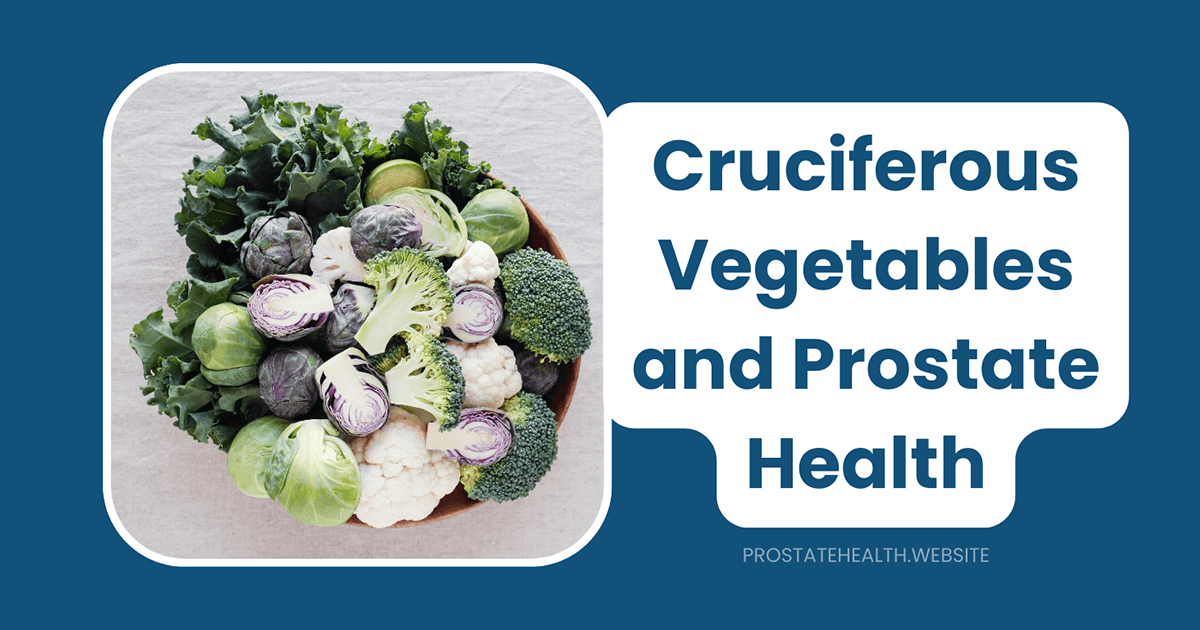The Mediterranean Diet: A Blueprint for Prostate Health

When Mark, a 58-year-old construction manager, received slightly elevated PSA results during his annual physical, his doctor suggested lifestyle changes before considering more invasive options. “I was skeptical that something as simple as changing my diet could make a difference,” Mark admits. “But I figured it was worth trying before jumping into medications or biopsies.”
Six months later, Mark’s PSA levels had stabilized, and he’d lost 12 pounds without feeling deprived. “I never thought I’d prefer olive oil to butter or fish to steak, but here I am, actually enjoying this way of eating.”
Mark’s experience isn’t unique. A growing body of research suggests that the Mediterranean diet—a centuries-old eating pattern from the olive-growing regions surrounding the Mediterranean Sea—may be one of our most powerful tools for promoting prostate health and potentially slowing the progression of prostate cancer.
Let’s explore why this ancient approach to eating is gaining modern scientific validation as a blueprint for prostate health.
Understanding the Mediterranean Diet: More Than Just Olive Oil
The Mediterranean diet isn’t a structured eating plan with strict rules. Rather, it’s a pattern of eating traditionally followed by people in countries like Greece, Italy, and Spain. Its core principles include:
The Foundation: Plant-Based Foods
- Abundant vegetables and fruits: 7-10 servings daily, providing fiber, antioxidants, and phytonutrients
- Whole grains: Unprocessed grains like farro, barley, and whole wheat
- Legumes: Beans, lentils, and chickpeas as primary protein sources
- Nuts and seeds: Small daily portions providing healthy fats and protein
The Healthy Fats
- Olive oil: The primary fat source, rich in monounsaturated fats and polyphenols
- Avocados: Providing additional healthy fats and fiber
- Limited saturated fats: Minimal butter and other animal fats
The Proteins
- Fish and seafood: At least twice weekly, emphasizing fatty fish like salmon and sardines
- Poultry, eggs, and dairy: In moderate amounts, a few times weekly
- Limited red meat: No more than a few times monthly
The Extras
- Herbs and spices: Used generously to add flavor without salt
- Red wine: In moderation (optional)
- Limited processed foods, added sugars, and refined grains
What makes this approach unique is its emphasis on whole, minimally processed foods and its balance of macronutrients—approximately 40% of calories from fat (primarily monounsaturated), 40% from complex carbohydrates, and 20% from protein.
The Science: How the Mediterranean Diet Supports Prostate Health
The connection between the Mediterranean diet and prostate health isn’t just anecdotal. Recent research has revealed several mechanisms through which this eating pattern may protect the prostate:
1. Reduced Inflammation
Chronic inflammation is increasingly recognized as a driver of prostate enlargement and cancer development. The Mediterranean diet is inherently anti-inflammatory due to:
- High polyphenol content: These plant compounds found in olive oil, fruits, vegetables, and red wine have potent anti-inflammatory effects
- Balanced omega fatty acids: Higher omega-3 (from fish) and lower omega-6 fatty acids help regulate inflammatory processes
- Limited processed foods: Fewer pro-inflammatory compounds from ultra-processed foods
According to research from MD Anderson Cancer Center, these anti-inflammatory effects may directly impact prostate cancer progression. Their study found that “every one point increase in adherence to the Mediterranean diet was associated with a more than 10% decrease in the risk of prostate tumor progression.”
2. Antioxidant Protection
The prostate is particularly vulnerable to oxidative stress, which can damage DNA and promote cancer development. The Mediterranean diet provides abundant antioxidants that help neutralize free radicals:
- Lycopene: Found in tomatoes (especially cooked tomatoes), watermelon, and pink grapefruit
- Selenium: Present in fish, shellfish, and nuts
- Vitamin E: Abundant in olive oil, nuts, and seeds
- Carotenoids: In orange, yellow, and dark green vegetables
A 2023 study published in Science Daily found that “men with plasma concentrations below 0.25 micrograms per milliliter for lycopene or below 120 micrograms per liter for selenium are at greater risk for prostate cancer.” The Mediterranean diet naturally provides these protective nutrients.
3. Hormonal Balance
The Mediterranean diet may help maintain healthier hormone levels, which is crucial for prostate health:
- Lower insulin levels: The diet’s low glycemic impact helps prevent insulin spikes that can promote prostate cell growth
- Moderate estrogen: Plant compounds like lignans may help regulate estrogen metabolism
- Reduced IGF-1: Insulin-like growth factor 1 is linked to prostate cancer progression and may be moderated by this dietary pattern
4. Weight Management
Obesity is a known risk factor for aggressive prostate cancer and poor outcomes. The Mediterranean diet supports healthy weight without restrictive calorie counting:
- High fiber content: Promotes satiety and healthy gut bacteria
- Emphasis on whole foods: Naturally regulates appetite
- Moderate fat content: Provides satisfaction while supporting weight management
According to a 2025 CNN report, “the Mediterranean diet has been recognized for its contributions to healthy weight loss and reducing obesity, which is a leading risk factor for cancer.”
The Evidence: What Research Tells Us About Mediterranean Diet and Prostate Health
The scientific evidence supporting the Mediterranean diet for prostate health continues to grow:
For Prostate Cancer Prevention
A 2017 meta-analysis cited by the Institute for Functional Medicine found that “higher adherence to a Mediterranean diet was inversely associated with the risk of prostate cancer development.” This suggests that following this eating pattern may help reduce your chances of developing prostate cancer in the first place.
More recently, research has shown that men who closely follow the Mediterranean diet have a lower likelihood of being diagnosed with prostate cancer. The protective effect appears to be dose-dependent—the more closely you follow the diet, the greater the potential benefit.
For Men with Prostate Cancer
For men already diagnosed with prostate cancer, particularly those on active surveillance for low-risk disease, the Mediterranean diet shows promise for slowing disease progression.
A study from the University of Texas MD Anderson Cancer Center, published in the journal Cancer, followed 410 men with localized prostate cancer on active surveillance. The researchers found that “men with higher adherence to the Mediterranean diet were less likely to experience disease progression requiring active treatment.” Specifically, for every 1-point increase in Mediterranean diet adherence score, there was a 12% lower risk of disease progression.
Interestingly, the effect was even more pronounced in certain groups:
- Non-White men showed a 36% lower risk of progression with higher Mediterranean diet adherence
- Men without diabetes had an 18% lower risk of progression
For Overall Cancer Risk
Beyond prostate-specific benefits, the Mediterranean diet appears to offer broader cancer protection. According to the 2025 CNN report, “adherence to the Mediterranean diet is associated with a 6% lower risk of developing obesity-related cancers,” regardless of body mass index or fat distribution.
This suggests that the diet’s protective mechanisms work independently of weight, though maintaining a healthy weight certainly provides additional benefits.
Practical Implementation: Building Your Mediterranean Meal Plan
Transitioning to a Mediterranean-style eating pattern doesn’t have to be overwhelming. Here’s a practical approach to gradually incorporate these principles:
Start with These Simple Swaps
- Replace butter with olive oil for cooking and as a condiment
- Substitute fish for red meat in at least two meals per week
- Add a handful of nuts as a daily snack instead of processed snacks
- Include legumes (beans, lentils, chickpeas) in at least three meals weekly
- Double your vegetable portions at lunch and dinner
A Week of Mediterranean Eating for Prostate Health
Monday
- Breakfast: Greek yogurt with berries, honey, and walnuts
- Lunch: Lentil soup with whole grain bread and olive oil
- Dinner: Baked fish with roasted vegetables and quinoa
- Snack: Apple with a small handful of almonds
Tuesday
- Breakfast: Whole grain toast with avocado and tomato
- Lunch: Mediterranean salad with chickpeas, feta, olives, and olive oil dressing
- Dinner: Chicken souvlaki with tzatziki, whole wheat pita, and Greek salad
- Snack: Hummus with carrot and cucumber sticks
Wednesday
- Breakfast: Overnight oats with cinnamon, apple, and pistachios
- Lunch: Tuna sandwich on whole grain bread with leafy greens
- Dinner: Vegetable and bean stew with a small portion of whole grain pasta
- Snack: Orange and a few walnuts
Thursday
- Breakfast: Vegetable omelet with whole grain toast
- Lunch: Grain bowl with farro, roasted vegetables, chickpeas, and tahini dressing
- Dinner: Grilled salmon with roasted sweet potatoes and steamed broccoli
- Snack: Greek yogurt with berries
Friday
- Breakfast: Smoothie with spinach, banana, berries, and almond butter
- Lunch: Leftover salmon on a bed of greens with olive oil and lemon
- Dinner: Vegetable paella with a small amount of chicken
- Snack: A pear and a small piece of cheese
Saturday
- Breakfast: Whole grain pancakes with fresh fruit and a drizzle of honey
- Lunch: Mediterranean mezze plate (hummus, baba ganoush, olives, whole grain pita)
- Dinner: Grilled sardines with roasted tomatoes and herb-infused bulgur
- Snack: A small handful of mixed nuts
Sunday
- Breakfast: Shakshuka (eggs poached in tomato sauce) with whole grain bread
- Lunch: Lentil and vegetable soup
- Dinner: Small portion of lean lamb with abundant roasted vegetables and quinoa
- Snack: Fresh figs and a small piece of dark chocolate
Focus on These Prostate-Protective Foods
Based on the latest research, certain Mediterranean diet components deserve special attention for prostate health:
Tomatoes and Tomato Products Rich in lycopene, especially when cooked, tomatoes are consistently associated with lower prostate cancer risk. Aim for daily consumption in forms like pasta sauce, soup, or roasted tomatoes.
Fatty Fish Salmon, sardines, mackerel, and other fatty fish provide omega-3 fatty acids that help combat inflammation. The selenium in seafood offers additional prostate protection.
Olive Oil Extra virgin olive oil contains oleocanthal, a natural anti-inflammatory compound with properties similar to ibuprofen, plus polyphenols that may help prevent cancer cell growth.
Cruciferous Vegetables Broccoli, cauliflower, Brussels sprouts, and kale contain sulforaphane and indole-3-carbinol, compounds that may help the body detoxify carcinogens and regulate hormone metabolism.
Nuts and Seeds Walnuts, almonds, flaxseeds, and pumpkin seeds provide zinc, selenium, and plant-based omega-3s that support prostate health.
Pomegranates Studies suggest that pomegranate juice may slow PSA doubling time in men with prostate cancer, potentially due to its potent antioxidant content.
Beyond Diet: The Mediterranean Lifestyle for Complete Prostate Health
The traditional Mediterranean approach to health extends beyond food. For optimal prostate health, consider adopting these additional lifestyle elements:
Regular Physical Activity
Mediterranean cultures traditionally incorporated physical activity into daily life—walking to markets, tending gardens, and enjoying leisure activities outdoors. Research from the Institute for Functional Medicine indicates that “physical activity is associated with decreased prostate cancer risk and improved metabolic health after a prostate cancer diagnosis.”
Aim for:
- At least 150 minutes of moderate activity weekly
- Strength training 2-3 times weekly
- Reduced sitting time (a 2022 meta-analysis showed that “high sedentary behavior increases the risk of developing several cancers, including prostate cancer”)
Stress Management
Chronic stress may impact prostate health through elevated cortisol levels, which some research suggests may correlate with higher PSA levels. Mediterranean cultures traditionally valued relaxation, social connection, and adequate rest.
Consider incorporating:
- Mindfulness meditation
- Time in nature
- Social meals with family and friends
- Adequate sleep (7-8 hours nightly)
Moderate Sun Exposure
Vitamin D deficiency has been linked to increased prostate cancer risk and more aggressive disease. Mediterranean populations traditionally received regular, moderate sun exposure, helping maintain healthy vitamin D levels.
While protecting your skin from damage, aim for:
- 10-15 minutes of sun exposure several times weekly
- Vitamin D testing if you live in northern climates
- Possible supplementation based on your doctor’s recommendation
Common Questions About the Mediterranean Diet and Prostate Health
Is it too late to start if I already have prostate issues?
No, it’s never too late. Research suggests benefits for men at all stages—from prevention to those with diagnosed prostate cancer. The MD Anderson study specifically found benefits for men already diagnosed with prostate cancer.
Do I need to follow the diet perfectly to see benefits?
While greater adherence is associated with stronger benefits, even moderate adoption shows positive effects. According to the 2025 CNN report, “occasional breaks from the Mediterranean diet can still provide some protective benefits against cancer, although full adherence is more effective.”
Should I take supplements instead of changing my diet?
Research consistently shows that whole foods provide benefits that supplements cannot replicate. The 2023 Science Daily study specifically recommends “obtaining nutrients from food sources rather than supplements, as the benefits of supplements are limited.”
Is the Mediterranean diet appropriate for men with diabetes?
Yes, and it may offer additional benefits. The Mediterranean diet has been shown to improve glycemic control in people with type 2 diabetes. Interestingly, the MD Anderson study found that men without diabetes showed a stronger protective effect from the diet against prostate cancer progression, suggesting that controlling blood sugar through diet may be particularly important.
Will I lose weight on this diet?
Many men do lose weight when transitioning to a Mediterranean diet, particularly if they were previously consuming a typical Western diet high in processed foods. However, weight loss isn’t guaranteed and depends on overall calorie balance. The diet’s emphasis on satisfying, nutrient-dense foods makes it easier to maintain a healthy weight without feeling deprived.
Success Stories: Men Transforming Their Prostate Health Through Mediterranean Eating
James, 64, PSA reduction “After my PSA levels started creeping up, my urologist suggested dietary changes before considering medication. I was skeptical but committed to the Mediterranean approach for six months. My PSA dropped from 4.8 to 3.2, and I lost 18 pounds without trying. The biggest surprise was how much I enjoy this way of eating—I don’t feel deprived at all.”
Robert, 71, managing BPH symptoms “My frequent nighttime bathroom trips were ruining my sleep and quality of life. Medication helped somewhat, but switching to a Mediterranean diet made a noticeable difference within weeks. I’m especially careful about limiting red meat and dairy, which seem to trigger my symptoms. Now I’m down to just one trip to the bathroom most nights.”
Michael, 58, active surveillance for prostate cancer “When I was diagnosed with low-risk prostate cancer, I chose active surveillance but wanted to do everything possible to prevent progression. Two years into following a strict Mediterranean diet, my latest biopsy showed no cancer progression, and my doctor is very pleased with my PSA stability. I can’t say for sure it’s the diet, but I’m not taking any chances by changing course.”
Conclusion: A Sustainable Approach to Prostate Health
The Mediterranean diet offers a rare combination in healthcare—a preventive approach that’s evidence-based, enjoyable, and sustainable for the long term. Unlike restrictive diets that focus on deprivation, this eating pattern celebrates delicious, satisfying foods while potentially protecting one of men’s most vulnerable organs.
As research continues to validate the connections between this ancient eating pattern and prostate health, the Mediterranean diet stands as a powerful tool in every man’s health arsenal—whether you’re focused on prevention, managing existing conditions, or supporting conventional treatment.
Dr. Michael Gregor, a prostate cancer specialist at University Medical Center, summarizes it well: “If the Mediterranean diet came in pill form, it would be hailed as a breakthrough in prostate health. The fact that it comes instead as delicious meals we can enjoy for a lifetime makes it even more remarkable.”
Ready to transform your prostate health through the power of your fork? Start with just one Mediterranean-inspired meal today, and build from there. Your prostate—and likely your entire body—will thank you.






